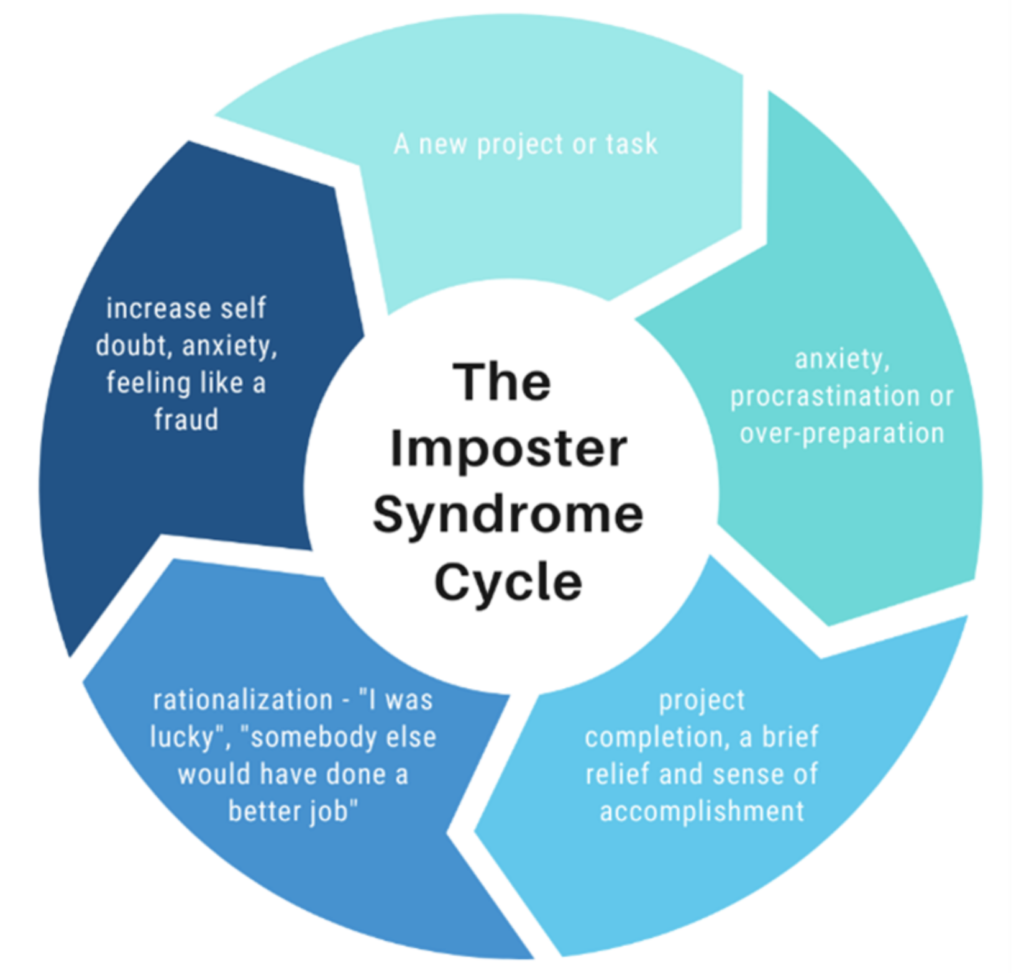One of the hardest things about struggling with your mental health is how alone the experience makes you feel. You assume that no one else is going through the same thing, feel uniquely bad or incompetent, and fear others might find out you’re not doing well and judge you. The truth is the complete opposite. We all struggle. We all go through ups and downs in our lives, we’re simply less likely to talk about them in public. We post funny GIFs and personal successes on social media, not descriptions of life unhappily ever after.
“I never negotiated salary because I was scared I would get ‘caught.’ I thought that I should prove myself before asking for more money.”
“It’s hard for me to give thorough/complete updates during scrum because I feel like I haven’t accomplished much. My teammates are usually the ones to point out [that I have].”
“I almost talked myself out of taking a promotion because I didn’t think I deserved it/could do the new job.”
“[Imposter syndrome] makes me try not to stand out so that no one will notice.”
“Self-doubt; inhibition; fear; dread; anxiety; [choosing] mundane tasks and not going for anything uncertain and interesting.”
“I find it very hard to describe [imposter syndrome]. You could say that it was motivating and demotivating at the same time. I feel like I’m constantly chasing a ghost version of myself that I will never actually catch, but I seem to be getting closer to every day.”
“Fake it until you make it!” It’s a mantra you’ve probably had to put into action at some point during your career – whether you had to fake confidence to get through a presentation or project self-assurance when stepping into a new promotion. But what happens when you just can’t shake the feeling of self-doubt? You may be dealing with imposter syndrome. The encouraging news is, you’re not alone.
According to a management expert at The University of Queensland (UQ) Business School, Dr. Terry Fitzsimmons, imposter syndrome is inextricably linked to self-doubt and low self-esteem.
“People who have imposter syndrome regularly question the validity of their achievements, often attributing career progression to luck rather than skill,” says Terry.
“Imposter syndrome makes people excessively uncomfortable with receiving promotions and rewards since they believe they are unworthy of these accolades – they see themselves as frauds who will one day be ‘outed’.”
“Sufferers tend to place excessive pressure on themselves to maintain the façade, manifesting in higher than normal levels of perfectionism and working excessively long hours.”
Imposter syndrome is a persistent belief that you are a fraud – despite being skilled, smart, and deserving of your accomplishments and praise. Rather than celebrating their achievements, people affected by this phenomenon live in fear of being ‘exposed’ and worry they aren’t as brilliant as they appear to others.
I would not limit myself to this definition – imposter syndrome also causes feelings of inadequacy, of not being enough just the way you are.
Imposter Syndrome is a learned behavior that happens through a set of triggers. We all have brain matter, and this brain matter can do something known as neuroplasticity, which is a set of trigger points that fire off in a habitual way. Something said or felt causes a reaction that triggers a behavior or a feeling that creates another feeling, and so on. It’s beneficial in everyday life, but sometimes the responses have a negative connotation which essentially sends us into a downward spiral thought process that ends up with this thing known as imposter syndrome. You react more negatively, and you don’t recognize yourself anymore.

In this example, you can see that the cycle trigger as an example of a new project or task, the anxiety and self-doubt triggers, which is relieved when you complete the Project or task and feel a sense of relief. However, the relief is short-lived, and the rationalization for your success starts to come in ‘I didn’t do it as well as someone else can’ Then this increases your self-doubt until the cycle begins again, and then you continue to spiral down.
So how can you tell if you are experiencing Imposter Syndrome? Are there signs or triggers? There are plenty and lots of further reading to help you resonate if you need to.
Here are some:
- Not believing that you earnt your success through your efforts but through change or other variables.
- Feeling inadequate in terms of ability, education, experience & intelligence
- Unable to internalize accomplishments and be proud of your competency & skills.
- You’re exaggerating your flaws and failures.
And how to break it?
- Focus on facts – Perform a SWOT analysis on yourself and sit with the facts rather than feelings.
- Acknowledge, Validate, and Let Go. Recognize that feeling.
- Reframe your thoughts – Reshape the way you think & set realistic goals.
- Share how you feel – Trust & Discuss with someone you can confide him; most have experienced this.
- Learn from your peers. No one here is the master of everything; lean & learn from each other.
- Pat yourself on the back. Be kinder to yourself.
We all started somewhere – no matter how fancy someone’s job title sounds, remember they too were once a newbie. They climbed up that ladder, yes, but the most important thing is that they started.
There is a quote by Robert F Kennedy which is very special:
“Only those who dare to fail greatly can ever achieve greatly.”
So, imposter syndrome happens, and there are ways to overcome it and work through it. May it never happen to you, but if it does … I hope you can recognize and work through yours.